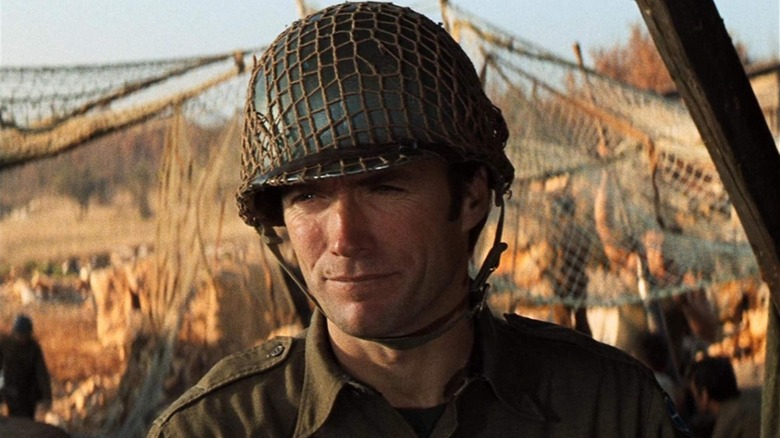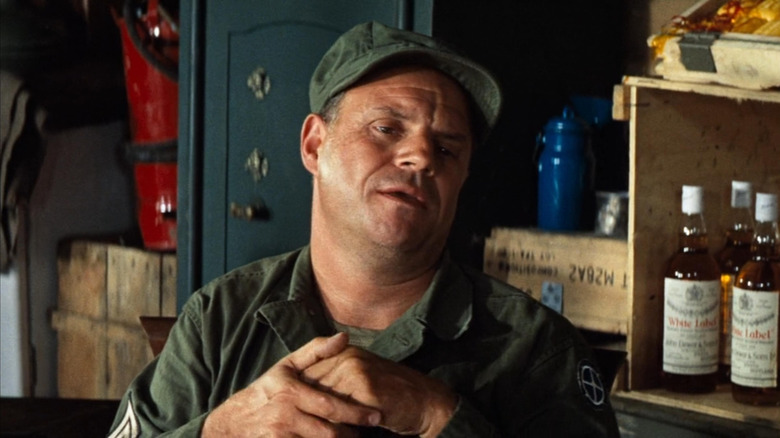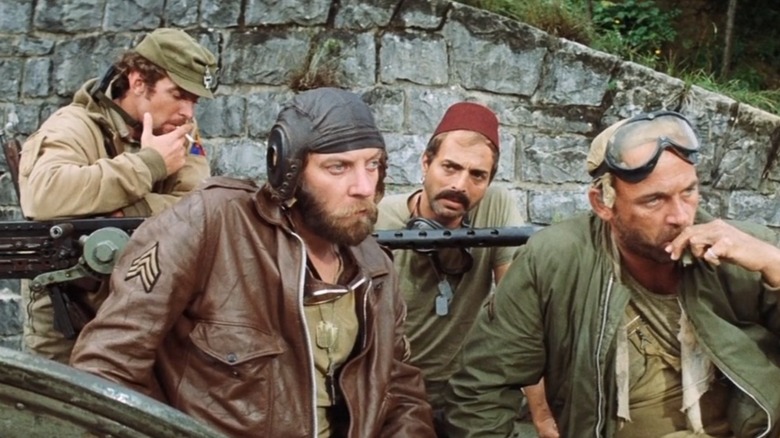This Clint Eastwood War Movie Was Based On A Guinness World Record-Holding Story
We all love a good heist, and there have been plenty of sensational real-life capers grabbing the headlines over the years. But which is the greatest? Names that spring to mind include the Great Train Robbery in the UK, the Lufthansa Heist (which played a key role in "Goodfellas"), and, more recently, the Antwerp diamond theft hailed as the "heist of the century." Those crimes pulled off record hauls, but in terms of sheer audacity, D.B Cooper parachuting out of a hijacked airplane with a bag of cash takes some beating. If the Guinness World Records is anything to go by, however, the greatest robbery ever carried out involved a stash of Nazi gold stolen from under the noses of the authorities in the aftermath of World War II. It sounds like a brilliant plot for a film and so it was, providing the inspiration for "Kelly's Heroes."
Starring Clint Eastwood as the titular character, the WWII-set heist adventure hit theaters in 1970. It was a big year for war films, with "Tora! Tora! Tora!" (which Akira Kurosawa was originally slated to co-direct), Robert Altman's dark comedy "M*A*S*H," Mike Nichols' adaptation of Joseph Heller's classic book "Catch-22," and one of the best war movies of all time, Franklin J. Schaffer's multi-Oscar-winning "Patton," also hitting the big screen. Among that stellar line-up, "Kelly's Heroes" initially comes across as being more like one of those famous 1960s men-on-a-mission flicks like "The Guns of Navarone," "The Great Escape," "Von Ryan's Express," or "The Dirty Dozen," before it reveals its more subversive nature.
"Kelly's Heroes" gave director Brian Hutton a chance to re-team with his laconic "Where Eagles Dare" star and blow even more stuff up, with Eastwood joined by Telly Savalas, Donald Sutherland, Don Rickles, and an excellent supporting cast as a motley crew of U.S. soldiers who go A.W.O.L behind enemy lines to steal a massive hoard of gold bullion from the Third Reich. Sprawling, noisy, macho, cynical, over-long, and often very funny, "Kelly's Heroes" was not a big box office hit despite earning by and large positive notices. Be that as it may, it's now regarded as a classic war film and is generally beloved among veterans. Let's take a look at the real-life robbery that inspired it and how the movie holds up today.
The real Kelly's Heroes?
The Guinness Book of World Records (now simply Guinness World Records) has been the go-to source for unusual fact-seekers since its first publication in 1955. Between 1956 and 2000, its listing for the greatest heist ever was this: "The greatest robbery on record was of the German National Reserves in Bavaria by a combination of U.S. military personnel and German civilians in 1945." The entry was most likely attributed to an out-of-print book called "Gold is Where You Hide It" by W. Stanley Moss, a former British officer and adventurer who visited post-war Germany to investigate large quantities of gold that had gone missing in transit.
When it became clear that Germany would lose the war, the Nazis moved their gold reserves and stolen loot to secret locations hidden in the southern part of the country. After the Third Reich fell, the Allies recovered most of the treasure. However, one cache of 100 gold bars never reached its destination at the depository in Frankfurt, believed stolen by two mysterious U.S. intelligence officers. Furthermore, there are suggestions that this missing stash was part of the much larger and still undiscovered Ribbentrop hoard valued at $366 million in today's money.
The Guinness entry piqued the interest of screenwriter Troy Kennedy Martin, who would also pen "The Italian Job." Metro-Goldwyn-Mayer was interested in the idea, and so, in December 1968, Elliott Morgan of the studio's research department wrote to Guinness asking for more details as there was no published record of the crime available elsewhere. Morgan received a reply from Norris McWhirter, one of two fact-obsessed identical twins who edited the book at the time. Mr. McWhirter advised that there was very little information about the heist and the listing was a "restricted classification." Not only that, but he also suggested that there may have been a cover-up involved.
McWhirter's suspicions were eventually proved correct. British journalist Ian Sayer, co-author of the sensational book "Nazi Gold: The Story of the World's Greatest Robbery — And its Aftermath," conducted a nine-year investigation as part of his research. He concluded that there had indeed been a cover-up by the U.S. government regarding the missing bullion and the suspected collaboration between American troops and former German officers. Sayer's investigation eventually contributed to the retrieval of two gold bars (worth over $1 million) in 1996, but the rest of the hoard is still missing.
How Kelly's Heroes holds up today
At first glance, "Kelly's Heroes" really does feel in keeping with the rollicking men-on-a-mission movies of the 1960s. It has all the elements, with tough cookie Clint Eastwood and Telly Savalas heading up a crew of grizzled faces assembled for a dangerous mission behind enemy lines. It can certainly be enjoyed as an escapist adventure on those terms, with plenty of action, explosions, and comedy along the way as its leads battle overwhelming odds on the way to their bumper payday of 14,000 gold bars. However, the movie's silliest and most anachronistic element is also the strongest hint that there is something more satirical and anti-authoritarian at play — namely, Donald Sutherland as the spaced-out tank commander Oddball.
Perpetually stoned, slurring groovy phrases, and discouraging any "negative waves" from his men, Oddball seems very much like a hippie who got lost at the tail end of the counterculture movement and found himself transported into a Boys' Own World War II film. In other words, his presence relocates "Kelly's Heroes" in the then-present day of 1970, where the Vietnam War was still claiming the lives of thousands of U.S. troops. That year, "Patton" waxed nostalgic for old-school military men like the eponymous general, but "M*A*S*H" and "Catch-22" struck a firmly anti-war note. "Kelly's Heroes" falls somewhere in between, giving bloodthirsty audiences hundreds of Nazis getting what's coming to them while simultaneously taking a more cynical and unheroic stance. In that sense, the title is ironic; the men here decide that since they will soon be cannon fodder on the frontline during the Allies' chaotic advance across occupied France, they might as well screw the greater cause and risk their lives trying to get rich instead.
The movie lets them get away with it, too. Unlike screenwriter Troy Kennedy Martin's "The Italian Job," which left Michael Caine and his gang on the verge of losing their stolen bullion over a cliff's edge, there is no threat of ironic comeuppance for Kelly and his collaborators, including the S.S. officer they strike a deal with to blow the vault. Neither are they troubled by good conscience, perhaps compelled to share the ill-gotten gains with the townsfolk they end up liberating during the course of the heist. They simply ride away into the sunset with the loot, much like the real-life robbers who inspired the movie.


